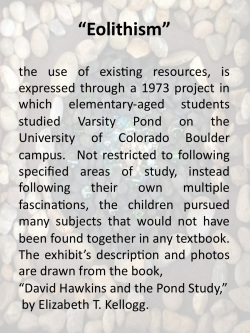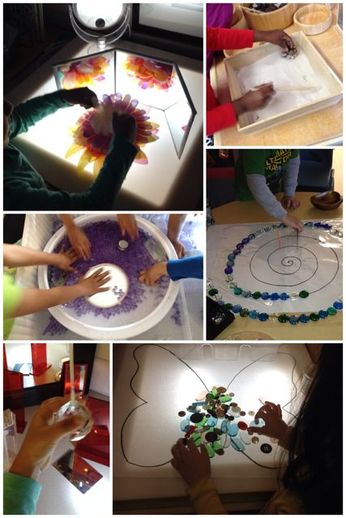
Hawkins' Inspired Learning
A legacy of D & F Hawkins: Joyful Constructivist Play
The theory of messing about
Children are given materials and equipment, things, and are allowed to construct, test, probe and experiment without superimposed questions or instructions. I call this phase "messing about".
David quoted in the trailer for "In the Child's Garden: The Educational Legacy of Frances and David Hawkins"
Panel photos from the Hawkins Exhibit at Richland School, October 2013
A fierce advocate for children's rights as capable learners
Frannie was just, she was passionate that people treat children with respect, and you didn't want to be around too much if you didn't, if she caught you being what she considered disrespectful and essentially robbing children of a chance to learn by telling them things, pushing them around, requiring specific responses... she didn't think that was doing the right thing and she was pretty comfortable letting you know that maybe you wanted to think about that".
As quoted in the trailer for "In the Children's Garden".
Synthesis (quoted verbatim from Ellen Hall's article linked above)
As our reflections on the question addressed by this paper continue to evolve, rather than a conclusion, I prefer to pause, synthesize, and summarize our thinking. What professional development in early childhood science will meet the requirements of practicing teachers?
To maximize the potential of early childhood science educators, professional development must…
- Be ongoing. To quote David Hawkins (2000), “It may be possible to learn in two or three years the kind of practice that then leads to another continued forty years of learning. Whether many of our colleges get many of their students on to that fascinating track, or whether the schools are geared to a thoughtful support of such endless learning by their teachers, is another matter. To understand the dimensions of the teaching art, complex and inexhaustible though it be, is an equally endless commitment and one that needs constant insight and renewal” (p. 41).
- Recognize and respect the desire of children and adults to co-construct knowledge about the physical and social world.
- Provide space to mess about with materials and time to engage in a sharing of ideas with other adults.
- Be closely connected to ongoing investigations in the school that are observed, documented, and analyzed.
- Utilize resources from the scientific community and from the political, economic, and cultural communities.
- Provide a forum through which teachers are able to gain competency as well as the feeling of competency—the empowerment and enthusiasm that is necessary to venture into a place of authentic inquiry with children and other adults.
Hawkins Gathering 2010
Further Reading: Blog Posts and articles about Hawkins-inspired learning
Hawkins Centers of Learning Lesley University Pre-Institute Day Documentary
cultivating the Scientist in Every Learner
"We who have been involved in the study of science and children have ourselves been changed in the process. In some ways not easy to express, we have been liberated. Those of us who knew children before science (are) now seeing the former, children, and ourselves as well in a new light: as inventors, as analysts, as synthesizers, as home lovers, as lover of the world of nature. Those of us who knew science first, and children after, have an altered and more child-like view of science, more humane, more playful, and even at its most elementary, full of the most unexpected delights".
David Hawkins as quoted by Karen Worth
David Hawkins as quoted by Karen Worth
Laurel Fynes
Shared class twitter: @109ThornKs
Email: laurel.fynes@peelsb.com
Website: http://thiskindylife.blogspot.ca
Phone:
Twitter: @KinderFynes





















